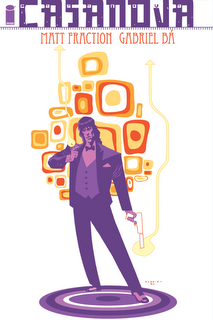 Casanova #1
Casanova #1writer: Matt Fraction
artist: Gabriel Ba
Image Comics, released 6-20-06
It's not too often when you finish a comic book and you sit for 10 minutes thinking about what it is you just read. But Casanova pulled it off. Reading this was comparable to the effects I was left with after listening to OK Computer for the first time -- it's like instantly knowing you've come into contact with a piece of art you're sure to cherish for years. It didn't quite go as far as handing me the mindfuck that an initial viewing of a Kubrick film typically does, but I wouldn't be shocked if this title eventually takes me to similar places. It clearly has that anything-can-happen vibe going for it.
So what is this budding, unpredictable masterpiece all about? Well, the short of it is that we'll be following Casanova Quinn -- a time-traveling, womanizing, scoundrel extraordinaire. He's essentially James Bond living in Doctor Who's universe with many of the complexities exhibited in Jorge Luis Borges' short story "The Garden of Forking Paths."
His story begins here with a contract to steal the Seychelle Ruby. Too bad for his client that the provided info has led him to the residence of Ruby Seychelle. But that's not Quinn's problem, he'll deliver her regardless. In the middle of his escape with Ruby, a high-ranking soldier of E.M.P.I.R.E. comes to arrest him at the behest of Cornelius Quinn, our hero's father and Director Supreme of E.M.P.I.R.E. Turns out Casanova's twin sister, Zephyr, was killed while investigating a tear in the time continuum. Quinn now takes it upon himself to solve his sister's murder through combining his underworld contacts with a few less-than-honorable methods of information extraction. This, of course, leads to mentally dueling with a mutant brain, jumping out of a flying casino, meeting with the leader of a "global theft and terror network," and hopping into additional streams of reality, among other adventures. All of this happens between quite a few surprising, yet earned, twists and before we discover the truth behind Zephyr's fate. Pretty damn memorable for a first issue, in my book.
All of this craziness is depicted wonderfully by Gabriel Ba, who I don't believe I've had the pleasure of being exposed to before. His work on this book is really quite impressive. Not only does he handle standard action scenes effectively, he even makes the mental duel mentioned above incredibly exciting, which I find very impressive since the scene is basically comprised of two people sitting down at a table. Another aspect of Ba's art that must be addressed is the color scheme. The entire issue uses only black, white and a dull green, but this limited pallet is hardly noticeable after a few pages in. He makes great use of shadow, which is reminiscent of Mike Mignola, but this is no rip-off. It is very evident here that Ba employs his own style.
Just as I had never picked up something by Ba previously, I hadn't heard of Matt Fraction before either. I was totally blown away by the scripting of Casanova, not only by the plot itself, but also the layout of the panels. First off, this issue is jam-packed with story. It doesn't take a break and action panels never takeover the page. They are strategically placed between key plot points and sly jokes (I laughed out-loud a lot when reading this issue). Probably my favorite feature in this book is the little panels of a character's head below a bit of text, usually from their perspective, explaining either who they are, what importance they have to Quinn, or another great joke. Some even contained all three in the span of two sentences. I've never seen that utilized before, but it's a fantastic method of storytelling that would be most effective in comics than any other medium. I hope it remains a standard feature of Casanova.
Finally, I have to address Fraction's afterward on the interior back cover. In it, he vaguely explains where the ideas for Casanova came from, including discussions with Warren Ellis and Phil Spector's "Wall of Sound." For those of you not familiar with Spector, he was a prominent music producer in the 60's for pop groups such as the Ronettes, the Righteous Brothers, and Ike & Tina Turner, and pretty much all of his production featured various layers of music that created an extraordinary and unique sound, one that no one else during that era could duplicate well. Spector's Wall of Sound is the impetus that gave Fraction the ideas that we see as Casanova. I found this revelation absolutely fascinating because I've never heard an author in any medium cite a style of music as the construction of their story, and it's the Wall of Sound!!! Who is this crazy man that thinks of reality-jumping men of espionage when he's listening to "Be My Baby"?
But, you probably don't care about the Ronettes, so I'll wrap this review up. Based on everything that went on in this book, Casanova looks to be on the path of a great run -- as long as you all pick it up off the stand, that is. I fear that titles such as this one will be ignored by fans for not being published by one of the big two and for residing outside of the superhero genre. I also believe that Fraction will be a big name in the world of comics if this one takes off or if he starts writing a high-profile book for Marvel or DC. Either way, pick up Casanova the next time you're at a shop. You won't be sorry.
10 out of 10

1 comment:
Keep up the good work. thnx!
»
Post a Comment